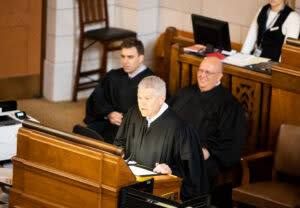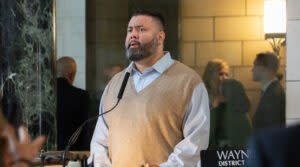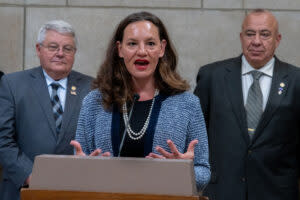Nebraska Supreme Court dismisses foster care abuse case against DHHS, expands immunity

- Oops!Something went wrong.Please try again later.
- Oops!Something went wrong.Please try again later.
- Oops!Something went wrong.Please try again later.
- Oops!Something went wrong.Please try again later.
Judges of the Nebraska Supreme Court (and when they were appointed), front row from left: Lindsey Miller-Lerman (1998), Chief Justice Michael Heavican (2006), William Cassel (2012). Back row, from left: Jonathan Papik (2018), Stephanie Stacy (2015), Jeffrey Funke (2016) and John Freudenberg (2018). (Courtesy of the court)
LINCOLN — A new Nebraska Supreme Court decision added fuel to some lawmakers’ desire to try again, as early as this year, to increase accountability for child sexual assault and abuse.
Chief Justice of the Nebraska Supreme Court Mike Heavican (Courtesy of the Nebraska Judicial Branch)
An unsigned majority of the state’s highest court, in a 4-1 opinion in Joshua v. State, issued Friday, upheld certain immunity for the Nebraska Department of Health and Human Services after three siblings alleged negligence after more than a decade of sexual and physical abuse in foster care. The opinion built upon the 2020 decision Moser v. State and overruled related cases, too.
Justices Jeffrey Funke and John Freudenberg did not participate in the decision.
State lawmakers passed legislation to change the underlying state law before Gov. Jim Pillen vetoed those revisions last month. Leading senators said they might try to call for a special session this summer on their own if the governor does not.
“We need a special session immediately to address this issue,” State Sen. Justin Wayne of Omaha, who helped lead legislative efforts this spring, said in a Friday text.
‘Public policy’ or ‘statutory construction’
At hand is the Political Subdivisions Tort Claims Act, which forbids certain lawsuits against political subdivisions, upholding “sovereign immunity.” This includes cases of assault or battery, which the majority said could be changed by the Legislature “as a matter of public policy.”
“This court is required by settled principles of strict construction to read that exemption broadly in order to preserve the state’s immunity,” the majority wrote.
State Sen. Justin Wayne of Omaha led legislation this year to amend state law, picking up 2023 proposals from State Sens. Steve Halloran of Hastings and George Dungan of Lincoln. Feb. 22, 2024. (Zach Wendling/Nebraska Examiner)
A penned dissent from the court’s longest serving member, Justice Lindsey Miller-Lerman, said the court “overlooked an opportunity” to limit the 2020 decision and differentiate between immune child assault and nonimmune child abuse.
Miller-Lerman said even under the Moser decision, “the actions of DHHS are nonliable.” She also dissented on the Moser decision, stating then that it diverted from the U.S. Supreme Court.
The senior justice would have returned the decision to a lower court to consider allegations of non-assault claims, including emotional abuse and domestic violence involving the foster family’s dogs.
“The problematic outcome in this case is the result of the application by the majority of its statutory interpretation in Moser and the progeny thereof with which, as I have repeatedly written, I respectfully disagree,” Miller-Lerman wrote.
“In my view, this issue is one of statutory construction, not public policy, and the solution is within the majority’s grasp,” Miller-Lerman continued. “In the absence of ambiguity, statutory interpretation is not a matter of public policy.”
Timeline of abuse
In January 1996, three siblings (Joshua, Sydnie and Abigail) became wards of the state after a serious car accident left their mother severely disabled and unable to care for them. Their biological father was deemed an unfit parent due to active alcoholism and instability in employment and housing.
Loree Woods, left, joined with State Sen. Danielle Conrad of Lincoln for an informal news conference following the veto of legislation that would have allowed new lawsuits against political subdivisions if negligence was a proximate cause of child sexual assault or abuse. Conrad holds a picture of Woods’ daughter, Taylor, a survivor of sexual assault. April 25, 2024. (Zach Wendling/Nebraska Examiner)
The siblings were placed in a foster home with Miles Ruch Sr. and Carol Ruch during which it is “generally undisputed” that the siblings were subjected to frequent physical and sexual abuse.
In August 2004, Sydnie and Abigail each told their foster mother that her husband had been sexually abusing them, and Miles Ruch was arrested, charged and convicted of multiple counts of sexual assault of a child.
The siblings remained in Carol Ruch’s custody for several months until reports indicated Carol Ruch had physically assaulted and injured Joshua.
In July 2005, the siblings were returned to their biological father’s custody, based in part on DHHS recommendations. Several months later, he was arrested for sexually assaulting Sydnie and Abigail.
A decade later, in December 2015, the siblings alleged DHHS failed to properly screen and monitor their foster home placement and later remove them from their home. The agency also failed to protect the children, they alleged, when they were reunited with their biological father.
Trial court passed on immunity
The district court issued $2.9 million in damages against Miles Ruch — but it concluded “that the siblings had adduced no evidence suggesting DHHS had any reason to foresee that he [the biological father] would sexually abuse the siblings.”
DHHS had argued it had immunity, which the lower court said was “somewhat compelling,” though it ultimately ruled a 1977 state case precluded immunity.
Gov. Jim Pillen speaks on Aug. 27, 2023, in La Vista, Neb. (Zach Wendling/Nebraska Examiner)
The Nebraska Supreme Court disagreed, stating the facts of the case were “undeniably tragic” and abuse of a child entrusted in the state’s foster court system “is deplorable.”
“But it is not the proper role of this court, even when faced with tragic and compelling facts, to pick and choose which tort claims arising out of an assault or battery should be permitted under the [laws] and which should not,” the court wrote.
Miller-Lerman said DHHS received multiple reports of abuse, yet the court’s reluctance means the majority has “effectively ruled that once there is an assault in the picture rendering the State immune, the State is also immune from suit resulting from cruel emotional child abuse.”
“I do not think this holding is supported by statute or the record,” she said.
Friday’s decision does not affect the $2.9 million award against Miles Ruch.
‘This is the wrong outcome’
State Sen. Danielle Conrad of Lincoln, an attorney, said the court’s decision to explicitly overrule a handful of other related cases, while it had done so “implicitly” before, was “breathtaking.”
For four years, lawmakers have sought to amend the act and expand lawsuits against political subdivisions — such as schools and state agencies. In the latest case, it would have been if subdivisions failed to use “reasonable care” to control or protect a child in their care in cases of sexual assault or abuse. Damages could have been awarded up to $1 million.
State Sen. Danielle Conrad of Lincoln. March 13, 2024. (Zach Wendling/Nebraska Examiner)
Lawmakers passed that measure 28-17 last month, but Pillen said it was “overly broad” and would “substantially erode” sovereign immunity protections, passing off costs to taxpayers.
“We must hold perpetrators accountable and protect children from abuse by enforcing the criminal laws that exist and by targeting the wrongdoer,” Pillen said in his April 24 veto letter. “Taxpayers should not bear this burden.”
The “callous veto” along with the court’s bad decision, Conrad said, was “yet another example of why the Legislature must act to reset the scales of justice and ensure that big government is held accountable when their actions or inactions hurt or harm its citizens.”
“You don’t need to be a legal scholar to understand that this is the wrong outcome,” Conrad said. “This shouldn’t be a political issue — this is a common sense issue.”
Special session could be next step
In Nebraska, a special session can only be called through a governor’s proclamation, which the governor or 33 senators can initiate.
Lawmakers gather on the last day of the 2024 legislative session, though many expect to return for a special session later this year. Not pictured: State Sens. Joni Albrecht, Ben Hansen, John Lowe and Tony Vargas. April 18, 2024. (Zach Wendling/Nebraska Examiner)
In the case of the Legislature itself — which has not happened in Unicameral history — 10 or more senators must formally declare the purpose or purposes of the session to the Nebraska Secretary of State’s Office. Within 10 days, the secretary must poll the body; if 33 or more agree, the governor has five days after receiving notice to convene the special session.
Special sessions are not limited to one topic, and a consideration of such legislation could come at the same time as an expected session on property taxes this summer.
“Make no mistake: whether it’s through a special session, which I think is the best remedy, or in next year’s regular session, this issue is not going away,” Conrad said. “We need Nebraskans to join us, to call for change to right this wrong, to say, ‘Not in our name.’”
GET THE MORNING HEADLINES DELIVERED TO YOUR INBOX
The post Nebraska Supreme Court dismisses foster care abuse case against DHHS, expands immunity appeared first on Nebraska Examiner.







